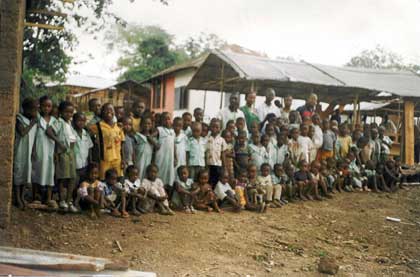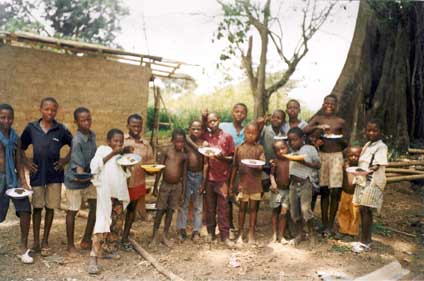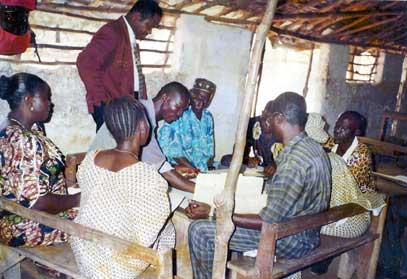|
During the dark and grim years of the Rebel War in Sierra Leone
it is estimated that across the country:
• 1,600 people, including babies and children were brutally
killed
• 500 people including children as young as six years old
have been maimed
• 300 villages and towns were burned to the ground
• 1,300 hospitals and health centers were burned to the ground
• 960 schools including colleges were looted, vandalized
or burned
About 60,000 ex-combatants have been disarmed and demobilized.
Over 55,000 ex-combatants are taking part in re-integration programs
in Sierra Leone.

Children At CEM School
About CEM -
CEM was established on October 16, 1992, by a group of churches.
It is registered with the Sierra Leone Ministry of Economic and
Development Planning as an NGO. Their mission is working with ex-combatants
to re-establish basic health and education services in collaboration
with the relevant government ministries.
CEM is an umbrella organization of churches in Sierra Leone that
is dedicated to the proposition that absolute poverty can be substantially
reduced through concerted action. CEM works with local churches
in order to enhance the spiritual and socio-economic wellbeing of
the people of Sierra Leone by contributing to the alleviation of
hunger and poverty, controlling disease, fostering education and
stimulating development.
CEM works with a variety of Sierra Leone government departments
and NGOs:
• United Nations Development Programme - Restoration of schools
• Commonwealth Police Task Force - Training of ex-combatants,
police reintegration and conflict resolution programs
• National Demobilization Re-integration Programme - Trauma
counseling skills training
• World Health Organization (WHO) - HIV/AIDS education and
workshops
• Ministry of Social Welfare - Gender and Children’s
Affairs
• Ministry of Education
|
The Gara Shirts sold by The
Peace Company are made by ex-combatant youth involved
in CEM’s re-integration programs. As part of our
Peace Gifts for Global Healing program, a portion of profits
from your purchase will be returned to CEM to help continue
this important work. |
|

Children eating lunch at CEM school
CEM’s Vision for Sustainable Peace
and Development
The CEM re-integration model involves the following elements:
1. Social Re-integration
a. Socio-psychological counseling
b. Basic adult literacy
c. Civic education
d. Capacity building for democracy initiatives
2. Economic Re-integration
a. Small enterprise promotion and micro-loans
b. Vocational training and skills development
c. Community based work programs
3. Target Beneficiaries:
a. Orphans, vulnerable children and children affected by the war
b. Women, especially widows and female heads of households
c. The aged and disabled
d. Refugees and displaced persons
e. Ex-combatants
f. Jobless youth
g. Families and communities
h. The police and army

CEM Staff Meeting
Cultural Considerations
All of CEM’s staff are Sierra Leone nationals with first
hand knowledge of local conditions and culture. Many come from rural
areas and are fluent in many native languages, allowing for direct
communication in even the most remote villages. This allows communities
to view CEM staff not as outsiders telling them what to do and handing
out money, but as partners willing to work with them as they try
to improve their conditions and opportunities.
The CEM participatory approach and familiarity with local norms
gives the organization flexibility to work with groups of various
sizes, experiences and expectations. Project participants have access
to all members of CEM. These factors allow for an on-the spot decision
making system within CEM.
Current CEM Initiatives
CEM is presently working with 500 destitute children through a
local church (Missionary Baptist Church) in Pendembu-Kailahun District.
CEM promotes the children’s project on behalf of the Missionary
Baptist Church in Pendembu. CEM has in the recent past, raised funds
locally to support the 500 orphans and destitute children living
with foster parents within the township. CEM conducts feeding programs
at intervals, depending on the availability of funds.
A school has been established with an enrollment of 200 destitute
children, who receive trauma counseling, informal education, literacy
skills and peace education from five paid teachers and ten volunteers.
There are 300 destitute children on the waiting list to be enrolled
in the program due to lack of accommodation. CEM has acquired ten
acres of land for the Missionary Baptist Church to construct a school
building so that all the 500 destitute children can be enrolled
in the program.
A school building project for the children to continue formal and
informal education is underway. After three years of work, the school
will begin to receive grants from the Sierra Leone government, and
teachers will be paid from the national funds according to criteria
set by the government of Sierra Leone. The project has a management
committee in Pendembu to oversee management of funds received for
the project. Oversight is also provided by the CEM National Committee
Board of Trustees.
For More Information
For additional information about the conflict in Sierra Leone please
visit the Human
Rights Watch website. |